Related Research Articles

Fielding Harris Yost was an American college football player, coach and athletics administrator. He served as the head football coach at: Ohio Wesleyan University, the University of Nebraska, the University of Kansas, Stanford University, San Jose State University, and the University of Michigan, compiling a coaching career record of 198–35–12. During his 25 seasons as the head football coach at Ann Arbor, Yost's Michigan Wolverines won six national championships, captured ten Big Ten Conference titles, and amassed a record of 165–29–10.

Benjamin Friedman was an American football player and coach, and athletic administrator.

Bernard W. Bierman was an American college football coach best known for his years as head coach of the Minnesota Golden Gophers football program. Between 1934 and 1941, his Minnesota teams won five national championships and seven Big Ten championships and had four perfect seasons. Bierman's five national championships rank him among the greatest college football coaches of all time, as only 2 coaches have won more.
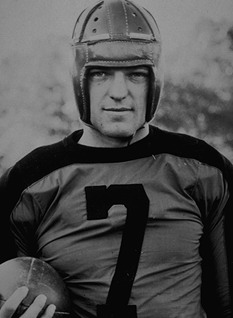
Earl Harry "Dutch" Clark, sometimes also known as "the Flying Dutchman" and "the Old Master", was an American football player and coach, basketball player and coach, and university athletic director. He gained his greatest acclaim as a football player and was inducted into the College Football Hall of Fame with its inaugural class in 1951 and the Pro Football Hall of Fame with its inaugural class in 1963. He was also named in 1969 to the NFL 1930s All-Decade Team and was the first player to have his jersey retired by the Detroit Lions.
William Phillip Dickens was an American football player, coach of football, basketball and baseball, and college athletics administrator. He served as the head football coach at Wofford College (1947–1952), the University of Wyoming (1953–1956), and Indiana University Bloomington (1958–1964), compiling a career record of 89–68–10. Dickens was also the head basketball coach at Wofford for one season in 1941–42, tallying a mark of 10–14, Wofford' head baseball coach for two seasons, from 1941 to 1942, and the school's athletic director from 1947 to 1952.
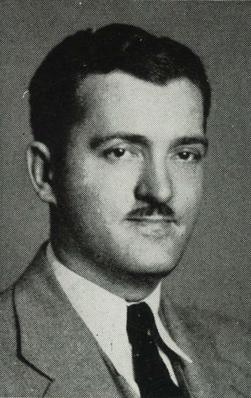
Cloyd V. "Big Red" Money was an American football, basketball, and baseball coach and college athletic administrator. He served as the head football coach at Hanover College (1927–1931), the University of Louisville (1932), Shurtleff College (1936–1939), Ferris Institute—now known as Ferris State University (1940–1941), and Northern Michigan University (1947–1955). Money was also the head basketball coach at Hanover (1927–1932), Louisville (1932–1936), Ferris (1940–1942), and Northern Michigan (1947–1956), amassing a career college basketball record of 180–164. In addition, he coached baseball at Louisville from 1933 to 1936, tallying a mark of 18–15.

Joshua Crittenden Cody was an American college athlete, head coach, and athletics director. "Josh" Cody was a native of Tennessee and an alumnus of Vanderbilt University, where he earned 13 letters playing several sports.
The Iowa Hawkeyes men's basketball team is part of the University of Iowa athletics department.
Herb Deromedi is a retired American football coach and college athletics administrator. He served as the head football coach at Central Michigan University from 1978 to 1993, compiling a record of 110–55–10. His 110 wins remain the most for a Central Michigan coach and stood as a record within the Mid-American Conference until 2019 when Frank Solich of Ohio University surpassed it. Following his coaching career, Deromedi served as athletic director at Central Michigan from 1994 to 2006.

Francis LeRoy "Pug" Lund was an American football player. He played college football as a halfback for Minnesota Golden Gophers and won All-Big Ten Conference honors in both 1933 and in 1934. He was captain of the 1934 Minnesota Golden Gophers football team that compiled a perfect 8–0 record and won the national championship. He won the Chicago Tribune Silver Football trophy as the most valuable player in the conference in 1934 and was also a consensus first-team player on the 1934 All-America college football team. Lund was elected to the College Football Hall of Fame in 1958.
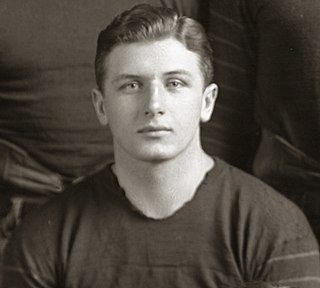
Henry Arthur "Ernie" Vick was an American football and baseball player. He was selected as an All-American center in 1921, played on the 1926 World Series champion St. Louis Cardinals, and was elected to the College Football Hall of Fame in 1983.

Edwin J. Mather was an American football and basketball player and coach. He was selected as an All-Western football player while playing for Lake Forest University in 1909 and went on to a coaching career at Kalamazoo College (1911–1916), Lake Forest (1916–1918), and the University of Michigan (1919–1928).
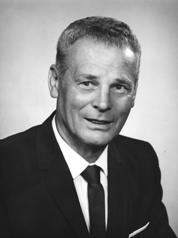
Walter E. Marks was an American football, basketball, and baseball player, coach, college athletics administrator, sports official, and university instructor. Marks played football, basketball, and baseball at the University of Chicago. Between 1927 and 1955 he served as the head football, basketball, baseball, and golf coach at Indiana State University, with hiatuses from 1930 to 1931, when he earned a master's degree at Indiana University, and from 1942 to 1945, when he served in the United States Army Air Forces during World War II. Marks was best known for his football and baseball coaching career(s); though his tenure as basketball coach was highlighted by the Sycamores' run to the semifinals of the 1936 U.S. Olympic Trials.

Fred Trosko was an American football player and coach. He played at the halfback position for the University of Michigan football team from 1937 to 1939. He later served as the head football coach at Eastern Michigan University from 1952 to 1964.
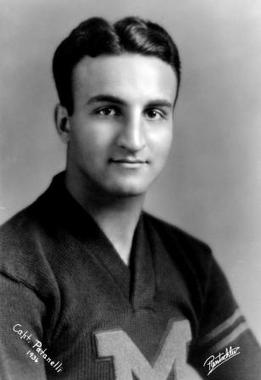
Matthew Lewis Patanelli was an American football, baseball and basketball player and coach. He played and coached all three sports at the University of Michigan and was selected as the Most Valuable Player on the 1936 Michigan Wolverines football team. He was also the first University of Michigan football player to be selected in an NFL Draft. He was an assistant football coach at Western Michigan University and the University of Michigan (1953–1958).

Karl L. Schlademan was an American college sports coach and athletics administrator. Principally a track and field coach, Schlademan also coached football, basketball and cross country. He served as the head track and field coach at DePauw University in Greencastle, Indiana in 1914, the University of Kansas from 1919 to 1926, the State College of Washington—now known as Washington State University—from 1926 to 1940, and Michigan State University from 1940 to 1958.
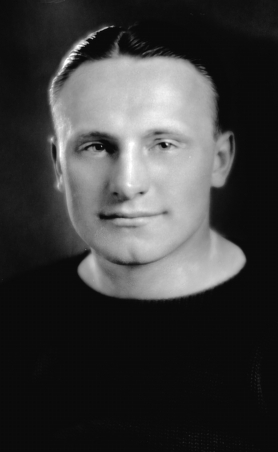
Joseph E. "Truck" Truskowski was an American football, basketball and baseball player and coach. He played college football, basketball and baseball at the University of Michigan. He later served as the head baseball coach at Iowa State from 1936 to 1937 and at Wayne State in 1941 and from 1946 to 1959.
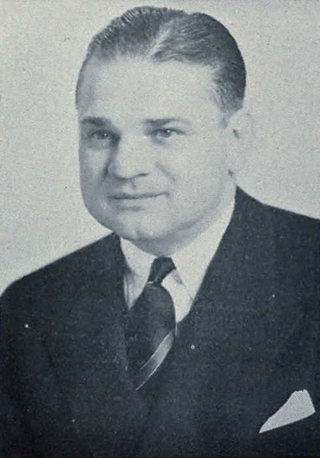
The history of Michigan Wolverines football in the Kipke years covers the history of the University of Michigan Wolverines football program during the period from the hiring of Harry Kipke as head coach in 1929 through his firing after the 1937 season. Michigan was a member of the Big Ten Conference during the Kipke years and played its home games at Michigan Stadium.
The 1936 Louisville Cardinals football team was an American football team that represented the University of Louisville as a member of the Southern Intercollegiate Athletic Association (SIAA) during the 1936 college football season. In their first season under head coach Laurie Apitz, the Cardinals compiled a 4–4 record.
Charles B. Hedgcock (1887–1986) was an American football and basketball coach and college athletics administrator.
References
- ↑ U.S., Social Security Death Index, 1935-2014
- ↑ "Apitz Athletic Director At Louisville University". Ironwood Daily Globe . Ironwood, Michigan. March 12, 1936. p. 7. Retrieved August 2, 2016– via Newspapers.com.

- ↑ "Billy Evans Picks Three Top Teams In Big Ten Selections". The Independent Record. December 3, 1926. p. 8. Retrieved July 24, 2015– via Newspapers.com.

- ↑ Cox, Earl (October 20, 1980). "Laurie Apitz was a one-man sports statf at U of L". The Courier-Journal . Louisville, Kentucky. p. 63. Retrieved January 21, 2018– via Newspapers.com.
